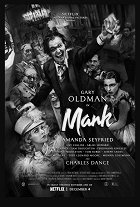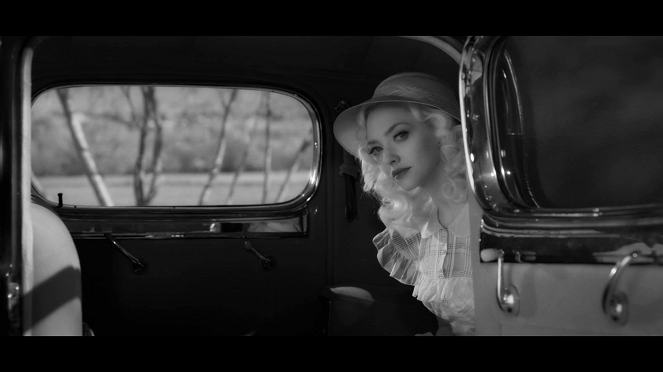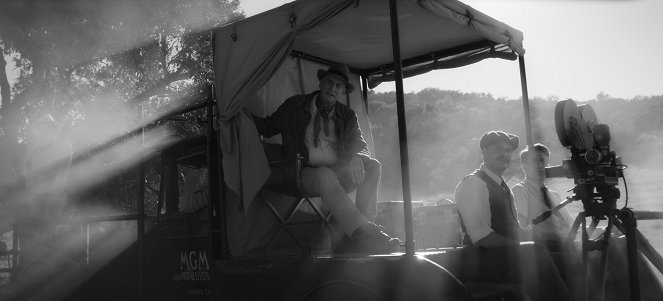Directed by:
David FincherScreenplay:
Jack FincherCinematography:
Erik MesserschmidtCast:
Gary Oldman, Amanda Seyfried, Lily Collins, Charles Dance, Tom Burke, Joseph Cross, Tuppence Middleton, Leven Rambin, Tom Pelphrey, Arliss Howard (more)VOD (1)
Plots(1)
1930s Hollywood is reevaluated through the eyes of scathing wit and alcoholic screenwriter Herman J. Mankiewicz as he races to finish Citizen Kane. (Netflix)
Videos (2)
Reviews (14)
"WhY dOEsN’t FiNCher MaKe aNoTHeR Se7en?!?§" the movie. A work hardly applicable in a non-American environment (god, just the idea that it has Czech dubbing or subtitles in the usual Netflix quality), for which one can't be mad at Jarmila Střížkova here for absolutely not knowing where its head is at. In our confines, then, it's mainly a problem that among the mainstream cashless-market critics, there is no one who has the will to interpret and articulate the film to the local viewer, used to boredly clicking through the endless Netflix offerings in his sweatpants on the couch to see if there is anything else capable of engaging him. We all laughed at the Spáčilová until we discovered that there never was a Spáčilová, it was always just us. The absence of Mank from theaters is one of the most unfortunate things to happen this year.
()
David Fincher is one of the greatest directorial aces and has long since established a position where we know that anything he makes will be at least interesting, and Mank is no exception. However, I suffered quite a bit as a viewer with it. This trip to 1940s Hollywood is no doubt a good film, and the depiction of the era, the politicking of the studios, and the life of a screenwriter who, though he drank a lot, could be all the more honest, is definitely worth watching, even if I was bored from the halfway point on. All those objective and technical qualities I can understand and subscribe to, Fincher knows what he's doing and he does it damn well. It's just that this time he didn't hit the mark for me in theme or indeed form. I simply didn't enjoy watching his new film. And he didn't want to make it any easier. Great atmosphere, a perfect Gary Oldman, great sets and music, but behind all that is the all-too-ordinary story of an all-too-ordinary man. I expect something more progressive from Fincher. Maybe, since he was directing his late father's script, he wanted to keep himself a little bit in check. I could understand that, but I'm not sure it was worth it.
()
A formally precise and linguistically exquisite picture about the writing of the screenplay for Citizen Kane. Unfortunately, apart from context of that period, it offers nothing new. Filming according to his father’s screenplay, Fincher nurtured all aspects of this heart-felt project and the way he presents the topic in the style of a forties movie is very appropriate. You can’t tell the difference. The actors are great down to the last one. The music is perfect: Reznor and Russ are brutally moderate, obediently serving the story. But it was strange to listen to Trent’s typical piano playing in a movie that clearly must have been filmed eighty years ago...
()
Mank certainly doesn't hide its Oscar ambitions and at the same time represents one among a number of films where (academic) form rolls over (audience-friendly) content. The black-and-white visuals, the fading blackouts, the vintage opening credits and the premise of the film take the viewer back to the golden era of Hollywood, a time of big studios, bright stars and screenwriting teams and solitaires. David Fincher's Mank is a skillfully made biopic, but for most of its running time it lacks any dramatic or deeper scene – it wasn't until near the end, when Mank's pours out of his heart while watching Citizen Kane, that I felt stronger emotions. A promising film in terms of acting and themes, but one that limps along on a lackluster execution.
()
It’s very inconsistent, I was a bit disappointed immediately after the screening, then I was writing a more extensive review, during which the film matured in me and, probably too naively, I started looking for cinephile themes and similarities or variations of Citizen Kane, only for Mank to vanish from my mind suspiciously fast a day later. I don’t mind the mythologisation of Orson Wells’s sparse participation in the screenwriting process of Citizen Kane, because I don’t take historical accuracy very much into account when evaluating a film, but it still affected my original idea regarding the coherence of the narration – though I think Fincher develops well the titular character, who in many aspects is a contrast of Charles Foster Kane (which is actually highlighted several times by the style and staging of some scenes), and provides a focused image of the time, but the individual segments feel a little haphazardly put together and don’t move the story forward much. The secondary characters are very numerous and at times it’s not clear what the author wants to say with this or that memory. Also, unlike his other films, Fincher doesn’t deliver any surprises, nor does he pull the viewer into a whirl of psychological motifs. Mank is a nostalgic retro painting that should hang at an art gallery attended only by very specific fans of period films, but it’s hanging between other new releases on Netflix, the brush strokes are clearly contemporaneous and evoke the style of the time only because they are in black and white. I respect Mank as something that brings diversity and a magical recreation of its time that irradiates love for filmmaking, and I must also admit that it didn’t bore me even for a second. I will gladly go back to it, but next time without expecting to find SOMETHING at any cost in this anticipated tribute to a great film and a difficult era (and I really tried and lied myself that that SOMETHING is there), and maybe I will be able to appreciate it from a different perspective. For the time being, though, I have to say that a couple of days ago I wouldn’t have believed that David Fincher could feel so impersonal (though still strong and beautiful to look at).
()



Ads